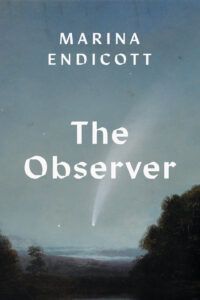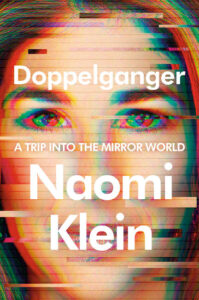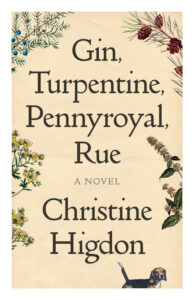September 26, 2023
The Observer, by Marina Endicott
Tomorrow night (Wednesday September 27) I’m appearing in Hamilton with Marina Endicott as part of a fundraising event for the Hamilton CFUW with an author talk and live music. Books will be for sale and available for signing after the event. Tickets are $15, support the CFUW scholarship fund, and on sale online or at the door! Buy yours now!
(I was also fascinated to see that, in both our novels, somebody cooks eggs that nobody ends up eating and which sit for too long before they’re finally thrown out…)
*
Oh, how I loved this quiet, meditative book, which was not about quiet or meditative things, but instead about violence, abuse, trauma, PTSD, deprivation, loneliness, and LOVE. A novel that doesn’t try to explain, just the facts, ma’am, but between the lines lies such depth and heart-wrenching emotion, with such beautiful prose floating right on the surface: “Does someone teach us to see beauty, or does the world show it to us all the time?”
It also just sparkles with its depictions of the rituals and rhythms of ordinary life, all the waiting, and enduring, and surviving. (“Not one to go to pieces, Kendra had brought a spinach dip in a bread bowl.)
The Observer is a fictionalized story of the Endicott’s own experiences as an RCMP spouse in rural Alberta, her protagonist, Julia, a playwright who arrives in Medway with her partner Hardy, an outsider in every way, but she receives a particular vantage point working for the local newspaper, from where the novel gets its title, and the novel is indeed her observations with minimal editorial, and her keen eye gives us a vibrant sense of the community, for better or for worse, and these stories of particular people because of a treatment of people in general, of society, of humanity: “But I needed more information, more data—not for gossip, but to understand Hardy’s situation and my own, to understand and choose how to live my own life.”
The Observer would make a really interesting companion to Kate Beaton’s Ducks, a different kind of story about rural Alberta, about being an outsider, about work, and male dominated fields, and violence, and loneliness, and such environments are bad for women and ultimately bad for everybody.
It’s a novel about light in the darkness (literally—its opening image is that of a comet), of being soft and porous in hard place, about hope amidst the harshness of reality, and about how sometimes all it ever takes to keep going is the miracle of *just one good thing.*
September 26, 2023
Gleanings
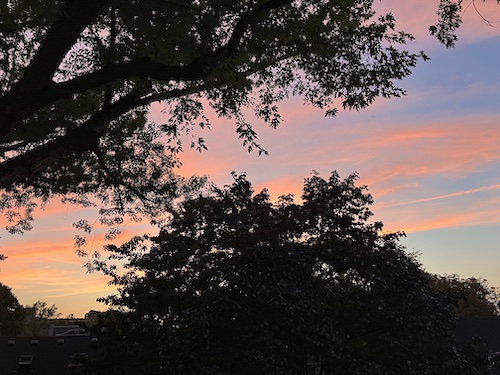
- The thing about the plot of an ordinary life is that it’s only revealed slowly and partially even to the one living it!
- This thinking always brings me to the same place: if there were no sweltering Augusts and frigid Februaries would I appreciate September as much as I do?
- During my brief period in acquisitions, folks would send me ideas and ask me if they should write them and unless they were really love stories about invertebrates and fruit, I said yes–I’d love to see it, but what I couldn’t say is, sounds promising, but how good a writer are you and how hard are you going to work on this? Because that’s what really matters.
- Instead, today is the time to celebrate human resilience. We can swim in the darkest waters but with time, those waters become clear again. It’s gradual to be sure. But it happens, even when you think it can’t and even when there is a pandemic thrown in to beat you back down.
- So … how to apply the blue zone lifestyle to one’s own, given the environment in which we live? How to live a relatively simple, healthy, active, stress-free life amidst modern amenities and technology? Is that possible?
- Instead of creating a Bucket List, I’m creating a Teacup Tally. A gentle guide to keep me from letting the weeks slip by without having enough fun.
- Production editors are the quality control of the publishing world. They manage the later phases of publication, starting from the copyediting stage right up to sending files to the printer. They apply deadlines, enforce quality standards, manage a team of copyeditors and proofreaders, and (meticulously) review content and provide feedback.
- We felt closer to the living world then. Closer, tied to its weather, its caprices, its inconveniences. It was easier to wait out the storms, the loss of power, because there were fewer gadgets. No computer, no cellphone, no heat pump, and we didn’t care as much about hot water for daily showers. Once, after a week without electricity, we went to the local pool, which did have power, to swim but mostly to use the showers. Our clothing smelled of woodsmoke.
- In a world, that doesn’t recognize the humanity of our cycles and seasons, that assumes, because it’s a Tuesday in September at ten in the morning, you should be at your optimum, just the same as a Thursday in May at three in the afternoon, it’s hard to allow ourselves the space and grace to ebb and flow just like nature, the nature that we are.
- Sometimes joy comes from the oddest places. And they’re not really that odd, they’re just not what we advertise as the joy makers, the things we should celebrate. And often, I wonder, if the things we should celebrate are oversimplified. The traditional milestones we hold out for, for ourselves and for those around us. We have them in the back of our minds, that tiny chest of clipboards, one per person in our lives.
- If you read this blog, you might know that I love a good Golden Age detective novel (particularly if it happened to be penned by Dorothy L. Sayers or Margery Allingham)…
- Long after Doug moved in to long-term care and I walked by myself, I’d stop and look over my shoulder. Even though I knew he wouldn’t be there. I thought this would be a habit for life. That I would never stop pausing, looking over my shoulder, making sure he was there.
September 25, 2023
Doppelganger, by Naomi Klein
I first found out about the Naomi problem in 2019 when I read No is Not Enough: Resisting the New Shock Politics and Winning the World We Need, and my best friend was horrified, and I was confused about why she was horrified, and then when she figured it out, she told me to google “Naomi Wolf” and “chemtrails,” so I did, and finally understood, or at least kind of, because what actually explains what happened to Naomi Wolf?
And so that question, “Whatever happened to Naomi Wolf?” is something I have periodically wondered about ever since then, the question becoming more and more relevant as Wolf’s own influence grew and the stakes got higher, as she spouted Covid misinformation through 2021 and onward. A question that seemed also relevant as so many apparently intelligent and curious people disappeared down conspiracy rabbit holes (ie the UK book blogger DoveGreyReader who went full QAnon before disappearing from the internet altogether, or the bestselling Canadian historical fiction writer who, as of Saturday but not thereafter [once someone had flagged it in their Stories], was following something called Gays Against Groomers on Instagram).
Last week was a fascinating time to be reading Naomi Klein’s latest, Doppelganger: A Trip Into the Mirror World, which is a consideration of “No Logo” Klein’s own personal branding problem as she has frequently been confused with Wolf over the last decade or so, but also an investigation of how the trajectory of liberal-darling turned far-right poster-child Wolf has a lot to teach us about radicalization, misinformation, political stratification, and the failures of political systems of countries like Canada and the US whose vacuums bad actors like Wolf and her comrade Steve Bannon, and so many others have rushed to fill. [Please note that I called referred to Wolf as “Klein” throughout this whole paragraph, and just had to go back and change it. The struggle is…weird?]
Last week was a fascinating time to be reading Doppelganger because the Mirror World of conspiratorial thinking was front and centre after supposed “parents rights”/anti-LGBT protests across the country on Wednesday that really were Convoy 2.0 with the same PPC signs and Fuck Trudeau flags (and I fear that well meaning people responding to these ding dongs with sincerity and heart are letting conspiracy nutjobs set the rules of engagement, like, it’s only a “culture war” if the other side mobilizes right back, playing right into their hands, which is exactly what they want, especially *play,* it all being just a game to these people anyway, rather than any of their ideas being worth responding to with consideration and logic. It is not irrelevant that, as Klein notes in her book, Steve Bannon dreamed up his ideas for world domination during a period in which he was working for an online gaming company)
In Doppelganger, Naomi Klein comes as closer as I’ve ever seen anyone come to explaining just what the heck is going on here, connecting the dots on a vast canvas, making sense of the nonsensical, in a way that will be familiar to anyone who’s read Klein’s work before, but also weaving in elements of memoir that are new to her work and which add a real sense of humanity to these stories in which so many of our fellow humans have come to seem almost alien.
Because of this book, I think I know finally (kinda, sorta) understand what was happening at the house I drove by in Norfolk County during the summer of 2022 that was flying a swastika out front, apparently a protest of the federal government. An anti-authoritarian protest that has one running authoritarian propaganda on one’s flag pole, the guy who hates Nazis so much that he’s appropriated their symbols, which is how it happens in the mirror world.
Doppelganger is a study of doubleness, and doubles—Klein and Wolf; left and right; self and avatar; who Wolf was and who she’s become; of how each “side” in this situation is imagining the other is living in a crazy dreamworld; of Israel and Palestine; of foundlings and how some parents of autistic children describe their offspring in similar terms, seemingly “normal” children replaced by another; about how so much far-right rhetoric employs language and ideas from progressive causes and can also thereby render language as meaningless. She writes about buffoonish monsters like Boris Johnson and Donald Trump, and even Putin, and describes “pipikism”—a term borrowed from a Philip Roth novel—”the antitragic force that inconsequencializes everything—farcicalizes everything, trivializes everything, superficializes everything.” She writes, “It doesn’t just farcicalize what they say; it farcecalizes what many of us are willing and able to say afterward.”
But of course any mirror is not just about its reflection, but also about what it tells us about ourselves, and Doppelganger is also a fascinating self-examination, as well as an actually kind and sympathetic study of what might have happened to Wolf and what particular aspects of her character make Klein a bit uncomfortable for what they suggest about Klein herself (and the last chapter, in which Klein describes them meeting in the early 1990s when Klein was a reporter for the University of Toronto’s student newspaper, The Varsity, is generous, weird and extraordinary). She also makes clear that social movements are the way out of this mirror world nightmare we find ourselves in, acknowledging that some conspiracies are indeed quite real (ie disproportionate power in the hands of a few unelected dudes who have too much money, for example) and showing that collective efforts are the only way to meet the pressing challenges of future (ie climate change, fear of which is provoking all this terror in the first place, such refusal to look reality in the face).
“Calm is resistance,” Klein writes in Doppelganger, quoting John Berger’s response to her earlier book, The Shock Doctrine, and I thought about that line too in the context of last week’s hateful demonstrations, how responding to panic and terror with panic and terror is simply a perpetuation of a narrative I don’t want to be a part of.
“The effect of conspiracy culture,” writes Klein in her new book, is the opposite of calm; it is to spread panic.” In Doppelganger, Klein suggests a deeper, more thoughtful way of acting (and thinking) in response.
September 20, 2023
The Long Game
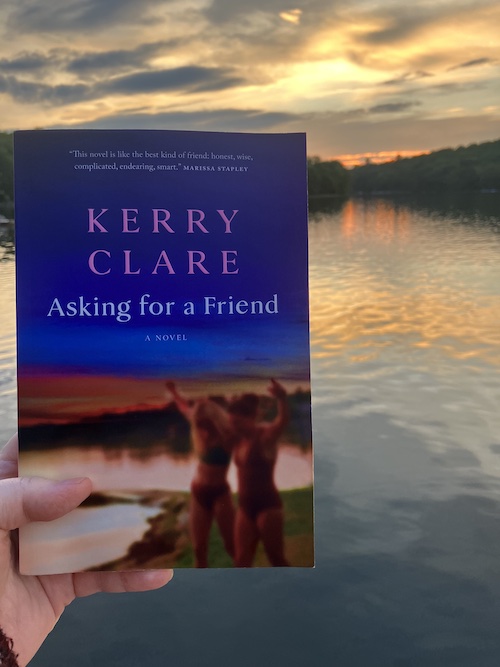
In late 2009, a pregnant friend of mine purchased a baby carrier that was a different brand and model than the one I’d recommended—I’d had a baby for five months at the time, and knew everything—and I was devastated. And not just because my hard-won advice had been passed over either, but because I knew that my friend and her child would suffer the consequences of this choice, and the stakes were just so high. Which is ridiculous, but also it wasn’t, because becoming a mother had blown my universe to tiny pieces and there were these certainties I had to cling to in the chaos, or else I’d have nothing to hold onto and be wholly lost in space.
I thought of this last week as I watched the inevitable online furor in response to a cover story in New York Magazine with the headline “Why Can’t Our Friendship Survive Your Baby?” I actually wasn’t very interested in the article, because I’ve been so bored for so long by how women with children and women without them are pitted against each that I edited an entire anthology about it (The M Word: Conversations About Motherhood, published by Goose Lane Editions in 2014), but the friendship angle was interesting to me because I’d just the week before published my fourth book, Asking for a Friend, which is all about how experiences of motherhood (and pregnancy, and abortion, and miscarriage, and infertility) can make friendships so fraught.
And not least because new mothers can be more than a little nuts (and I’m speaking for myself here—but I know I’m not the only one). It all can seem so personal. Case in point, my upset about the baby carrier (Team Baby Trekker for the win!), but also any debate over breast versus bottle, sleep training or attachment parenting, cry it out or (you, personally) crying it out. The best thing about my kids being older now is that we’re beyond most of all that (and guess what?! Almost none of matters!), though there are new tensions—what age do we let our kids have phones, for example. Or that I am relatively comfortable with my low-stress approach to my children’s education, but sometimes when I see the cars lined for pickup at the intensive after-school math program in my neighbourhood, I wonder how we’ll ever know for sure if we’re doing it right.
One of the epigraphs to Asking for a Friend comes from Erin Wunker’s Notes from a Feminist Killjoy, a line that, when I read it, articulated something I’ve been struggling with for always. “Is it to hard to write your own narrative and witness another’s, simultaneously? …Is that why some friendships between women crash into each other, noses pressed against glass, waving with wild recognition at the person on the other side, and then recede with the same force? Too much, too close, too similar, too uncanny?” (The other epigraph comes from a poem from Erin Noteboom’s new collection A knife so sharp its edges can’t be seen, that poem beginning with “What things are lost? / Many. Most. And those that make it,/ spared by chance…”)
I think that what I’m trying to say is that it’s amazing that any friendship survives at all, and that there are sometimes gulfs among friends who have children that are just as insurmountable as those between people with kids and those without them.
Ann Friedman phrased this so beautifully in her newsletter last week where she wrote:
“The kids question” is not a binary choice, but a complex and personal orientation that is also fluid—likely to shift over the course of a lifetime.
The term also helps me understand why phases of life when many of us are in the throes of working out our reproductive identities (um, our entire 30s?) can feel so stressful between friends. It’s rare for any two reproductive identities to be identical, even when the surface-level choice appears the same. Calling it an “identity” really captures how deep the feelings go, and how tectonic the shifts feel. How hard we have to work to understand and be understood.
“How hard we have to work to understand and be understood.” That’s the crux of it, right? That female friendship isn’t easy, regardless of whatever a particular friend happens to be going through, though there are some women who find it easier just to opt out altogether (“It would have been so easy to count the ways I’d been betrayed by girls… It was not that way with men,” was the line in How Should a Person Be? where Sheila Heti lost me altogether). But behind that hard work, all the doing, the fraughtness and the tension, there lies the richness, in being seen and known and understood, especially by people who themselves have made different choices and live in different circumstances.
Or maybe I’ve always known…that friendship is a long game. That sometimes one friend is going to require more generosity and understanding than the other. That you can’t grade a lifelong friendship based on one year’s performance. That it is deeply rewarding to have friends who lead very different lives than you do.
One of the infinite number of wonderful things about being in my forties now is finally beginning to see how the long game is going to play out, realizing just how much staying the course is actually worth it, and how much all those early tensions—as we were becoming ourselves—would really cease to matter at all. And yes, being seen and known can be as agonizing as it is rewarding, but the true reward—of course—lies in the company we get to keep.
September 19, 2023
Gin, Turpentine, Pennyroyal, Rue, by Christine Higdon
Christine Higdon has followed up her award-winning debut with the most extraordinary new novel, Gin, Turpentine, Pennyroyal, Rue, a book that somehow manages to be everything all at once: action-packed, artful, playful, timely, timeless, weighty, light, compelling historical fiction that maps so beautifully onto right now. Set in Vancouver in the 1920s, it’s the story of the four working-class McKenzie sisters and their supposedly divergent paths over the course of a year—infertility, pregnancy, an illegal and nearly fatal abortion, and a lesbian relationship–and how these paths are not divergent at all, but instead irrevocably connected to bodily autonomy, choice, and women’s liberation. The 1920s’ backdrop is fun and compelling, but the glitter stark against the darkness of what came before—the sisters watched loved ones return from WW1 with minds and bodies broken, or else not return at all; their brother dies in the flu pandemic; their mother is depressive and addicted to opium. The novel moves between their points of view, including the secrets they keep from each other, with a sweep that’s at once both intimate and cinematic, the narrative held together by an omniscient beagle (of course). A truly brilliant literary (and feminist) achievement, and just a wonderful read, I loved this book so much!
September 18, 2023
Hamilton!
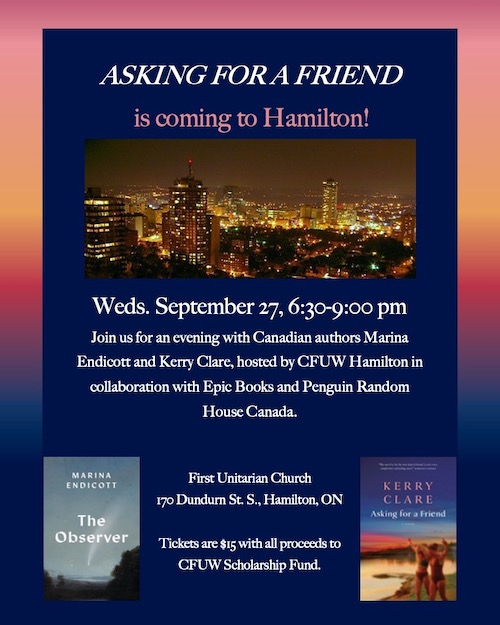
NEXT WEEK! Purchase tickets now!
Join us for a captivating evening with acclaimed Canadian authors Marina Endicott and Kerry Clare, hosted by CFUW Hamilton in collaboration with Epic Books and Penguin Random House Canada.
Doors open at 6:30 with live music. At 7:00 Jill Downie will lead a lively discussion about the new books, The Observer by Marina Endicott and Asking for a Friend by Kerry Clare.
This will be followed by an author meet-and-greet where you will have a chance to buy signed copies of the books.
You will be supporting education through scholarships to students attending McMaster University and Mohawk College. All proceeds go to CFUW Scholarship Fund.
September 14, 2023
September
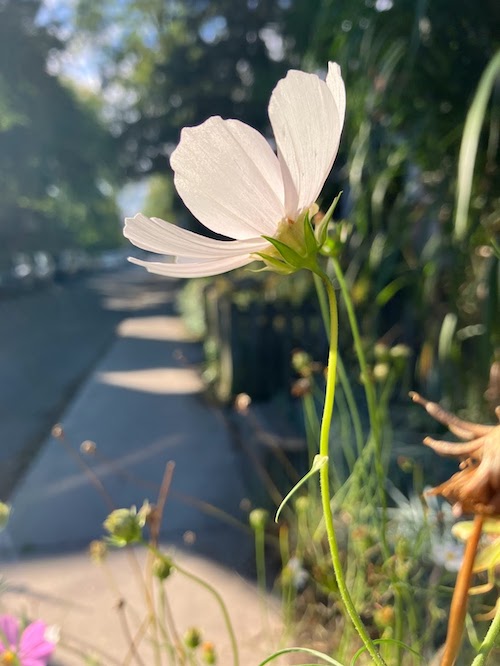
We pay the price of summer’s end, but look at this beautiful golden light (back-lighting a cosmos. which is an object that exists to be shone on and through). The sun came into my kitchen today for the first time in months, golden light across the floor and then the table. A gift.
September 12, 2023
Gleanings
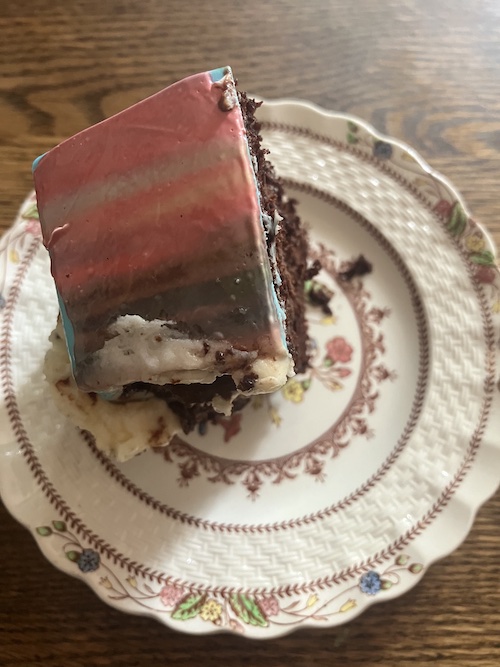
- Eyes to see what’s right in front of me. Eyes that don’t turn away. Eyes that are connected to the heart, not the stories of the mind. Eyes that see the sacred, the holy, the reverent in all of it. Eyes that dance with wonder and curiosity. Eyes that meet what’s here, now. Eyes adjusted to the bigger story, the mystery.
- I often wonder at the origins of a person’s bookish habits, The What and How of what we keep and Why. And, our love of books to begin with, is it a nurture or nature thing, the fact of growing up with many books or almost none, of being read to daily or never being read to, that makes a difference or is there some other mystery involved?
- It’s actually amazing, how people are surviving, shining, in amidst all the trauma. And yah, sometimes we’re just trying our best, too, trying not to end up buried and gone. Trying to use our souls as best we can, remembering the good qualities of those around us. Doing what we can with what we have, remembering to give what grace we can.
- For years, I mocked this love for sameness. Until I woke up to discover myself with a daily egg on toast, just one element of a tightly choreographed morning ballet that is best not interfered with. The walls of my small comfort zone (CZ, I’ll call it) sit on a foundation of DNA.
- The marginality of women and women’s words in the OED is another illustration of Jenni Nuttall’s point that advances in knowledge don’t always represent progress for women. As lexicography became more “scientific”–more systematic, more fact-oriented, more rigorous–it also became more male-dominated, and more masculinist in its assumptions about what did or didn’t belong in dictionaries.
- Back in June, I set a few goals that pointed toward a changing horizon. Softer, maybe, and calmer and gentler and as beautiful as the view across the lake from the sunset deck at my stepsisters’ cottage. The sky at sunset is always different but familiar, different but known, different if you take time to sit and savour it each evening. Otherwise, you might believe you’d see the same sunset and sky over and over again, and you might be bored by what you think of as repetition. But it’s not repetition, it’s texture and nuance and depth. It’s a groove, not a rut, as my friend Lisa says.
- To age wisely is to be willing to unlearn as well as learn. September can be a month not only for learning new things, but unlearning what no longer serves us. Or others.
- You might say that in attempting to solve the mystery of my own family through fiction, I blurred the line between reality and family legend even further. I do hope my ancestors will forgive me.
- Maybe it’s just one of the gifts fiction can offer us—a temporary respite, a refuge. It’s not that there isn’t trouble and heartache in the story Lara tells her daughters, but while they listen they are safe and loved. There’s definitely room for novels like that in my reading life.
- We’re still the very same people we were in Northumberland, but now we’re looking forward to having many more new experiences and passing many more milestones here in Essex County. Turns out, no matter how many miles we move, nor how much time passes, nothing changes, really. And that’s a good thing!
- The first time I read Beatrice and Barb was when I was going through the submissions pile on my desk. It’s a mystery to me how it landed there — but am I ever grateful that it did! I knew right away that I wanted to sink my teeth into the story. I always try to listen to that voice — that eagerness to start working on a manuscript. I sent you an email to say that I loved your story, and we met for coffee to talk about my editorial notes … and the rest is history!
- After the hurricane I promised myself I would never again take for granted the joy of turning on a tap to fill a glass with drinking water. I am promising myself now that I will never again miss the opportunity to smile at people – loved ones and strangers – or to kiss someone I love.
- Poignant, funny, horrifying, moving, smart, enraging, absurd: these are all adjectives that came to mind when I sat down to write this review of Alicia Elliott’s brilliant debut novel And Then She Fell. It’s a quick and intense read, with incredible, chatty, and hilarious chapter titles and a thoroughly amazing prolonged climax that I absolutely will not spoil for you, even though I am dying to write about it.
- I love writing. And I needed to take a break from it this summer so I could remind myself who I am writing for.
- When you spend 18 hours on a train with the small group of people with whom you were waiting for it arrive, you get to hear their stories.
September 11, 2023
10 Things I’m Looking Forward to in September

- Getting back to blogging, both writing and reading!
- Not having a rash (maybe?)
- Cool nights
- Weekends in the city
- Turning the oven on
- Promoting my book. (Did I mention I have a new book out?)
- Squash season!
- the Victoria College Book Sale
- working on my WIP
- Autumn leaves…
September 7, 2023
AFAF is Launched!
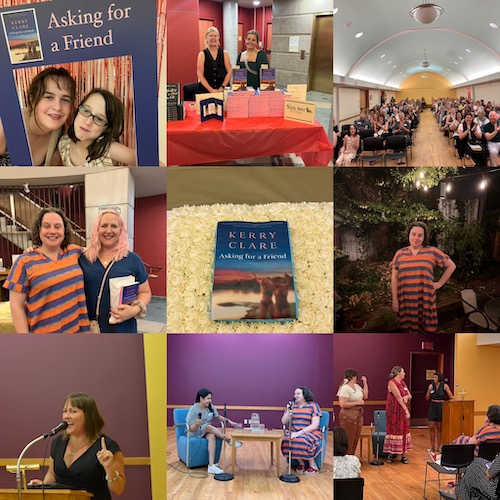
Thank you to everyone who attended my launch last night at the Lillian H. Smith Library. It was an extraordinary night, everything I wanted, and this whole week has been joyful and fun.
